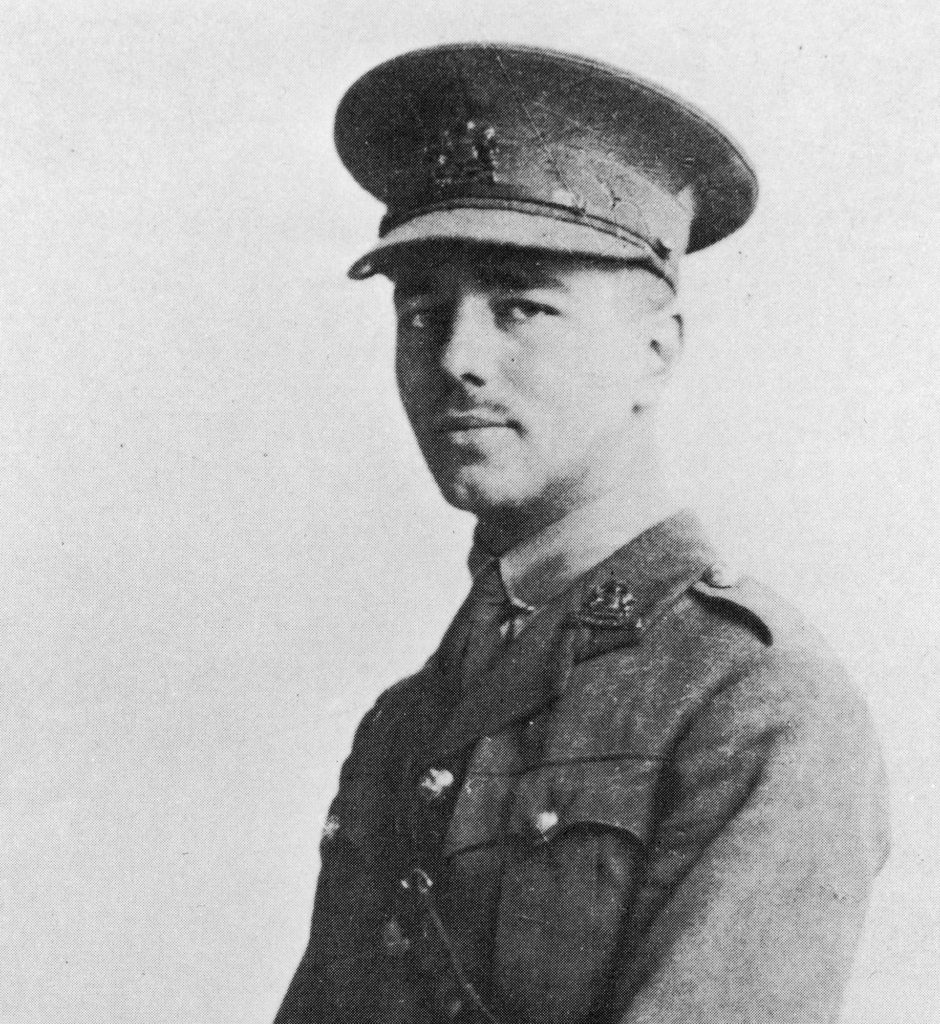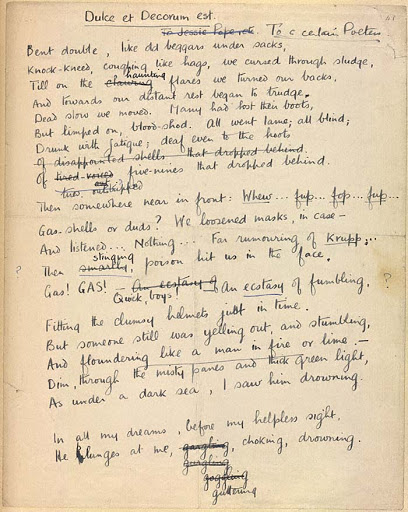
War is usually a bloody series of battles between 2 or more factions. Usually, it is between different tribes or countries. In Dulce et Decorum, Wilfred Owen describes war as being deadly, very bloody, and disgusting where soldiers are innocently killed, ripped apart, and treated like beggars without hope or worth.
However, during wars, countries generally tell their people that it is an honor or privilege to die for your country; that is what ‘Dulce et decorum et pro-Patria Mori’ means. However, in Owen’s poem, he argues that in reality, it is not heroism, but it is quite disgusting and could even make you hate your country.
In the first stanza, Owen portrays the impression that war makes the soldiers more exhausted and hag-like. “Bent double, like old beggars under sacks.” In ‘Bent double,’ Owen forms the impression that joining the war causes an enormous amount of fatigue and exhaustion. Soldiers are working until their bodies are twisted and contorted, making their experience seem completely different than the sort of marching we usually see in military parades.
It is comparable to beggars who have terrible health, sickly bodies, and old hags. It’s similar to women who are cramped up and wrinkled with curved backs, not all the proud and glorious soldiers marching in a much-organized fashion; this leaves an impression that war is boring and exhausting, where soldiers are working like slaves all day with bags so huge that it appears that you are under the bag, not that the bag is over you. They are abnormally deformed with their knees closed together while their ankles far apart.
In stanza 1 again, Owen gives the impression that war is disappointing and makes the soldiers appear drunk, or even like zombies from the exhaust, continuing their fight to survive. Even without a gas bomb or a battle, they are still like zombies. “Drunk with fatigue; deaf even to the hoots that. Of disappointed shells that dropped behind,” ‘Drunk’ shows that they were in a terrible physical state that they seemingly appeared to be drunk, not able to walk, looking mad, and crazy.
‘Fatigue’ here reflects that it is not caused by alcohol abuse, but due to overdose of work, making them weary and tired. They seem sick or drunk-like even before they started a battle or survived a gas bomb. ‘Deaf to the hoots’ further shows how handicapped they are from war; they even lose their senses. ‘Hoots’ shows that the shells are useless and they became gentle like owls, this might be because they are used to the sound of shells.
Now, it is like background noise for them. Also ‘disappointing’ might suggest that the bombs not only are useless for the enemies but are disappointing the soldiers because they want the shells to hit them, so it could put an end to their misery and torture, letting them eternally. This gives the impression that war promotes hopelessness, making soldiers want to die as they are worn-out by work.
In stanza 2, Owen gives the impression that war is clumsy and may be slow or too easy to survive. “GAS! Gas! Quick, boys! – an ecstasy of fumbling, Fitting the clumsy helmets just in time”. The ‘GAS! Gas! Quick, boys!’ shows shock and the repetition of the shock, reflecting the panic and confusion in war. GAS is in capitals portrays the yell of warning and panic, while an exclamation mark reflects a feeling of shock and surprise.
It is repeated in exclamation marks to convey how much time it took for them to realize, amid all the confusion and chaos. ‘An ecstasy of fumbling, Fitting the clumsy helmets just in time.’ ‘Ecstasy’ shows how much chaos there was by comparing it to a drug effect, previously they were compared to drunks and now they appear to be drugged (overflowing with emotions) from all the confusion and disorganization of the soldiers drained of their strength. ‘Fumbling’ and ‘fitting’ have alliteration with the letter F that makes the reader think of fear subliminally. This gives the impression that war was disorganized and just a constant battle to stop yourself from being the victim of the survival series.

In the 2nd stanza, Owen conveys that soldiers die slowly and devil-like. It also shows the helplessness of watching the soldiers die in disgusting, melting-like ways. “Floundering like a man in fire or lime”. ‘Floundering’ shows how bad the struggle to survive is by comparing it to a struggling fish trying to live on land, jumping around helplessly, this is like a man burning helplessly, plunging about without hope.
‘Fire’ or ‘lime’ shows how bad the gas was, burning him like acid or fire from the inside, comparing it to the most torturous thing people can imagine experiencing. This creates an impression that war is terribly disgusting and VERY painful.
In the 3rd stanza, it shows how war is as bad as your eye can see or even imagine, Owen compares the scene of the dying man slowly from the gas to the worst of nightmares that haunt you every night. “In all my dreams, before my helpless sight, He plunged at me guttering, choking, drowning”.
Because the trio of verbs are verbs that end in –ing, it gives the sense that the action is in the present tense. The soldiers die over and over in his dream, making the suffering of wartime casualties never-ending. Also, these three verbs (‘guttering, choking, and drowning’) are brutal, merciless verbs.
He ‘plunged’ at him shows how he is struggling like a fish but is helpless and the narrator cannot help him while he watching him slowly get murdered by the fire and lime-like gas, ‘my helpless sight’.
Owen described how disgusting war and death are and then sarcastically warns the reader that war is not like what children and teenagers think it is, but that is the impression the country gives to them, which is nothing but an old lie. ‘My friend, you would not tell with such high zest the old lie: Dulce et decorum est Pro patria mori.’
He says ‘my friend’ talking to the reader, this is the reality of war, it is all death, however ‘my friend,’ if you still didn’t understand that it is the complete opposite of the lies the countries tell to encourage you to join the war. In a sarcastic tone, showing that it is obvious that it is not what children and teenagers think of as all glory, victory, and pride. With great enthusiasm and energy, you would not tell them confidently that it is sweet and right to die for your country because on the inside you know you are wrong.
In the poem, Owen gives the impression and explains the reality of war. The terrible reality is described by the gruesomeness and the state in which the soldiers try to survive, wasting their lives innocently. He is showing how it is not at all like what the people think and encourage the children to go to war. All that about glory and right and sweetness to DIE for your country is nothing but lies to persuade you into war by tricking you into thinking it is all energy and victory.
After coming back from war, your whole life changes, you have seen the worst a human can see, IF you come back properly, you would not tell the children, ‘it is nice and sweet to die for your country’, with big enthusiasm and pride, but by knowing in your heart that it is a lie.

You said ‘”He plunged at me guttering, choking, drowning”. Because the trio of verbs are verbs hat end in –ing, it gives the sense that the action is in the present tense.’, however, rather evidently, this is in the past tense; due to the fact that he “plunged” (past tense for those of you who do not understand basic English lexicon). For instance, I could say ‘he was flying’ and although the verb ends in ‘-ing’ it is still in the past tense.
did we ask?